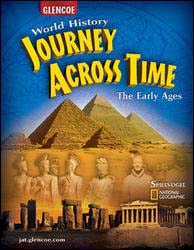
World History: Journey Across Time, The Early AgesChapter 15: Medieval EuropeChapter OverviewsAfter the fall of the Roman Empire, Germanic tribes established kingdoms throughout Europe. With help from monks and missionaries, the Roman Catholic Church spread Christianity across Western Europe. During the Middle Ages, invasions by Germanic tribes weakened kingdoms, and peasants looked to nobles rather than kings for protection. This shift in power created a new system called feudalism, which made Europe safer and led to the increased production of food and goods. These improvements increased trade and led to the growth of towns and cities. This growth created a need for city governments and workers groups called guilds. After William the Conqueror was crowned king of England in 1066, the cultures of the Normans and Anglo-Saxons mixed. The power of the English king increased during the rule of Henry II. King John's abuse of power led English nobles to draft the Magna Carta and set up a Parliament, which limited the king's powers. The French created their own parliament called the Estates-General. After the Mongols destroyed the Kievan Rus, the Slavs rebuilt the city of Moscow and founded a new Russian state headed by a czar. The city became the headquarters of the Eastern Orthodox Church and grew wealthy from trade. In 1071 Muslim Turks defeated the Byzantines. Europe responded to the Byzantine emperor's cries for help with a series of Crusades. European crusaders captured Jerusalem, but despite early victories, and more than 200 years of fighting, the last Christian city fell to the Muslims in 1291. The Crusades positively impacted Europe by breaking down feudalism and increasing trade. As a strong wave of religious zeal swept across Western Europe, monasteries were built and new religious orders were founded. The Catholic Church played an important role in the daily lives of medieval Europeans. Church leaders wanted all Europeans to accept its teachings and used its power to stop heresy. During the Middle Ages, anti-Semitism was very strong, and European rulers forced Jews to leave their countries. As governments and economies grew stronger, medieval Europeans felt more secure. Trade, banking, and business prospered. The Church and government leaders supported learning and the arts. Universities were founded to educate and train scholars who studied law, medicine, and theology. After reaching a high point in the 1300s, Europe was hit with a terrible plague that killed millions and disrupted Europe's economy. Western Europe was further devastated by war. The French and English engaged in the Hundred Years' War. In the Reconquista, Spain and Portugal struggled against the Muslims to win back the Iberian Peninsula. |  |















